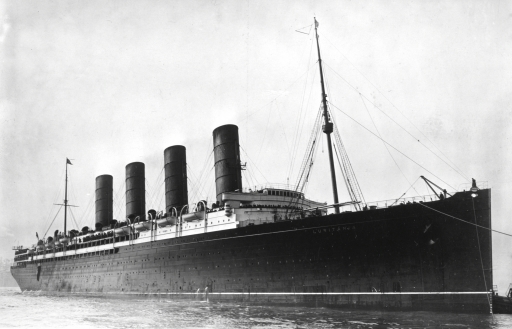The passenger ship Lusitania was carrying munitions when it was sunk by a German submarine in May 1915, documents released by the British Government have revealed.
The sinking of the ship with the loss of 1,198 passengers was depicted as an example of German ruthlessness during the First World War.
The truth that it was carrying weapons was hidden to help persuade the Americans to enter the war which they did in April 1917.
Lie
The lie was carried on by successive British governments who were worried about their relations with America.
The Lusitania was torpedoed eight miles off the coast of Ireland and sank in 18 minutes. While Germany claimed the ship was carrying munitions, concealed in beef barrels and cheese, British officials denied it and claimed it was carrying only passengers.
But files released from the National Archives in London under the 30 year rule reveal that in 1982 officials feared the wreckage could literally “blow up on us” when a group of divers planned to examine the remains.
The officials feared that if the munitions were found it would discredit a key reason for the Americans joining the war.
Sue
There were also fears that American survivors and relatives of those who died could sue.
“Successive British governments have always maintained that there was no munitions on board the Lusitania (and that the Germans were therefore in the wrong to claim to the contrary as an excuse for sinking the ship),” wrote Noel Marshall, the head of the Foreign Office’s North America department, on 30 July 1982.
Dangerous
“The facts are that there is a large amount of ammunition in the wreck, some of which is highly dangerous. The Treasury have decided that they must inform the salvage company of this fact in the interests of the safety of all concerned.
“Although there have been rumours in the press that the previous denial of the presence of munitions was untrue, this would be the first acknowledgement of the facts by HMG.”
Scandal
A senior government lawyer, Jim Coombes, warned there could still be a political scandal if it was found that there had actually been explosives on board.
‘It cannot be denied that the sinking of the Lusitania did much to sway American opinion in favour of entering the war,’ he wrote.
“If it were now to come to light that there was after all some justification, however slight, for the torpedoing, HMG’s relations with America could well suffer.”
Posted by Mike Swain, Centenary News
Source: National Archives.
Image: Public domain.
